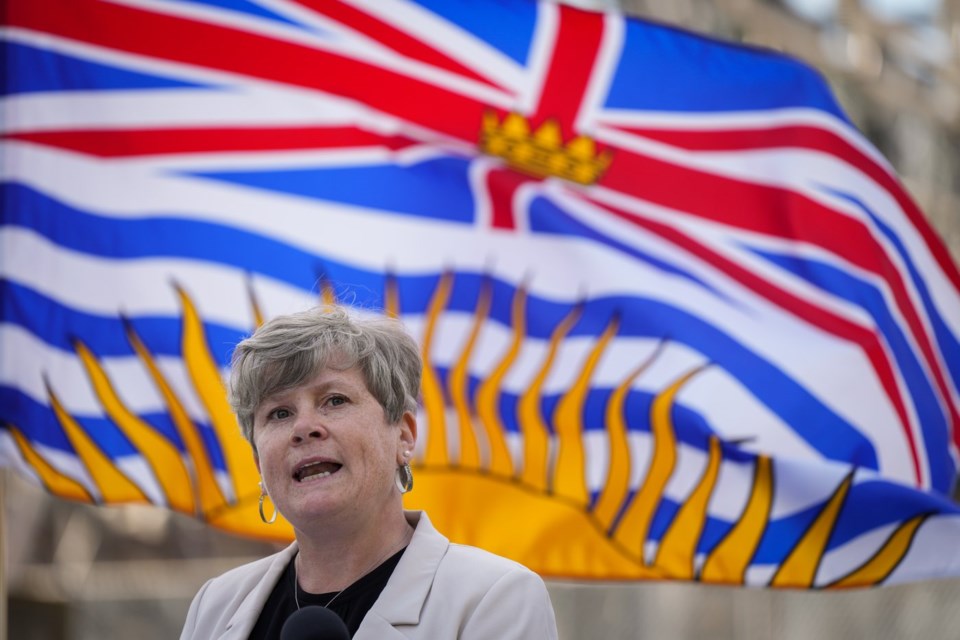VICTORIA — British Columbia Health Minister Josie Osborne has announced a major revamp of its safer-supply anti-addiction program, converting it to a "witnessed-only" model in which users are watched as they consume opioids they have been prescribed.
It was a "significant" change to end the take-home model and it would be difficult for some, but the move was designed to reduce criminal diversion of prescribed alternatives to illicit street drugs, Osborne said on Wednesday.
Critics of B.C.'s safer-supply program have long complained that diversion of prescribed opioids such as hydromorphone was being downplayed by the government, and Opposition B.C. Conservative Leader John Rustad pounced on the issue in the legislature's first question period in nine months.
He said Premier David Eby had been "gaslighting" British Columbians about the impact of the safer-supply program, which Conservative public safety critic Elenore Sturko said had led to "publicly funded drug trafficking."
Both called on Eby to launch a public inquiry.
"The real question that the public is asking is, who knew in advance how bad the situation was? When did they know about it?" Rustad said.
"And, quite frankly, the taxpayers want to know how much of their money was wasted on drugs getting into criminals' hands."
Eby called the change in strategy "an unfortunate thing but a necessary thing."
"We know it saved lives, stabilized lives," Eby said about the safer-supply program.
Osborne had told reporters during a press conference ahead of question period that the change would be immediate for new patients, and there would be a "smooth and safe transition" for current patients.
"These medications will be taken under the supervision of a health-care worker, and that includes hydromorphone," she told a news briefing in Victoria.
"This helps guarantee that the patient receives care in a safe, supportive environment, and significantly reduces the likelihood of diversion."
Last March, former solicitor general Mike Farnworth and the RCMP's commanding officer in B.C. both said there was no evidence of "widespread" diversion.
But earlier this month, a leaked Ministry of Health briefing for police said a "significant portion" of opioids prescribed in B.C. were being diverted, and prescribed alternatives were being trafficked provincially, nationally and internationally.
Osborne said an investigation into diversion was started by a Ministry of Health investigative unit last June.
The B.C. Association of Chiefs of Police welcomed the witnessed-only model and said "additional safeguards around safe supply programs" would prevent diversion of prescription medication.
The BC Green Party's interim leader, Jeremy Valeriote, said the change would be "untenable" for people trying to maintain jobs and care for their families while visiting a pharmacy multiple times a day.
"Instead of maintaining access to life-saving medication, this change risks pushing individuals back to the illicit supply chain, increasing overdose risks, and worsening the crisis the B.C. NDP is trying to address," he said.
Osborne also provided an update on an investigation into what she and Eby called "bad actors" among pharmacies that are allegedly contributing to diversion and paying illegal kickbacks to drug users and doctors.
Some pharmacies allegedly exploited the PharmaCare program that pays for each drug dispensation as well as witnessing customer's drug consumption, she said.
"I want to emphasize that we have over 1,500 pharmacies in British Columbia, and most pharmacies are providing high-quality care to people, but through these investigations we've received allegations of this kind of illegal activity at roughly 60 pharmacies, and we are investigating every single one of them," she said.
The Health Ministry said in a news release that there would be "changes to fix the fee structure for pharmacies that provide prescribed alternatives."
This would "avoid financial incentive for bad actors to offer kickbacks."
Osborne said the government would work closely with the College of Pharmacists of B.C., "and then if the information warrants being passed on to the RCMP for criminal investigation, we'll pass that on there."
Osborne said that the ministry investigators began their work after "allegations, stories, anecdotes came forward last year."
In January, the B.C. Conservatives had called on the NDP government to adopt recommendations from a group of addiction medicine clinicians who called for a pharmacist or nurse to supervise use of hydromorphone.
More than 16,000 people have died in British Columbia since the toxic drug crisis was declared a public health emergency in April 2016. Although 2,253 people died last year, that was down 13 per cent, and was lower than any year since 2020.
This report by The Canadian Press was first published Feb. 19, 2025.
Marcy Nicholson, The Canadian Press




